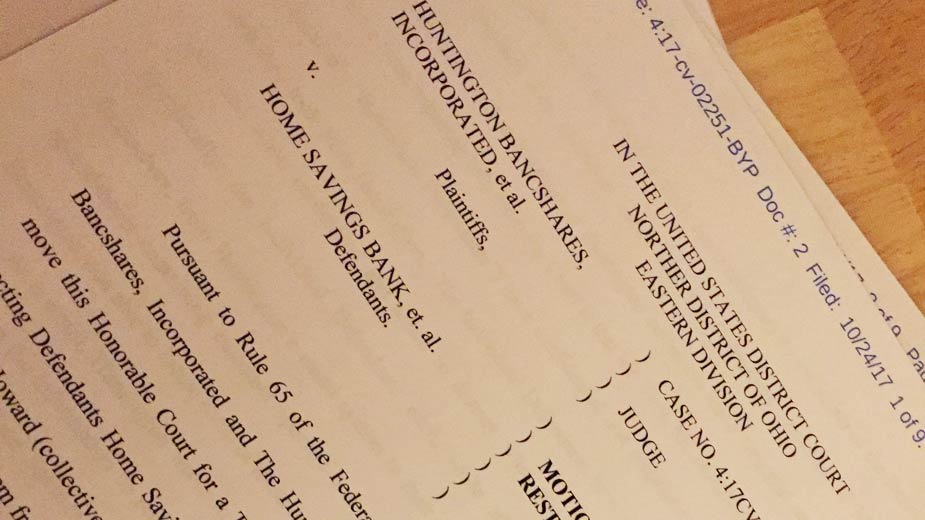Home Savings Needs More Time to Review Allegations
YOUNGSTOWN, Ohio – Home Savings Bank says it needs until Dec. 15 to fully investigate the allegations made by Huntington National Bank in a lawsuit filed Oct. 24 that accused three of its former commercial lending officers who joined Home Savings in late September of taking with “confidential information, proprietary information or trade secrets.”
The motion, filed Nov. 8 in U.S. District Court, is not opposed by Huntington, according to the court document.
“This request is not made for purposes of delay,” the motion states, “but rather to provide [Home savings] with additional time to investigate the allegations in the complaint and for the parties to continue their active discussions regarding opportunities to narrow the issues in this case and to evaluate the potential for early resolution.”
U.S. Judge Benita Y. Pearson had postponed until Nov. 8 her decision in the lawsuit, which sought a temporary restraining order, so the banks could resolve their differences with the aid of third party.
The three former Huntington employees named in the lawsuit are Joshua Toot, now senior vice president of commercial banking for Home Savings Bank; and Kevin Dougherty and David Howard, Home Savings vice presidents and commercial relationship managers.
Pearson met with counsel from the banks Oct. 25 in her chambers and determined she would hold off on ruling on the TRO “to allow the [banks] to effectuate the agreement [they] reached during the conference.”
In her order, Pearson wrote that the banks agreed that Toot, Dougherty and Howard “will not solicit current employees of Huntington to leave their employment.”
In addition, the banks “will hire, at their cost, a third-party vendor to review all computers and/or electronic devices” the three bankers used “from April 14 until Oct. 25 to determine what, if any, Huntington information is contained in their computers and that the review will be completed by Nov. 8.”
Should the third party determine that Toot, Dougherty or Howard has such information in their computers, “it will be provided to Huntington and destroyed by the third-party vendor.”
In a statement, a spokeswoman for Home Savings said her bank “is committed to complying with the law and any contractual obligations its employees may have to former employers and disputes that it engaged in any unfair competition against Huntington.”
In its motion seeking the TRO, Huntington claimed that when Toot left Huntington he had a restrictive covenant that forbade him from soliciting the customers he served when he joined Home Savings.
All three took “proprietary and confidential customer information” from Huntington and “attempted to hide” this misappropriation, the complaint states.
“When confronted and asked to destroy what was taken, [they] refused to do so,” according to the lawsuit. “Specifically, the defendants, while still employed by Huntington, sent themselves, from Huntington’s email system to their personal email accounts, documents and spreadsheets containing customer information specific and other confidential or proprietary information. Huntington locate[d] some of these documents.”
Huntington wrote to Toot, Dougherty and Howard and Home Savings Bank, asking that the contested information be returned, that no copies be made and that Home Savings certify that the documents and information were destroyed.
The general counsel of Home Savings, Jude Nohra, informed Huntington that the bank directed the three to comply and that “he would provide Huntington with a full listing of anything taken from [that bank] and such documents would be destroyed.”
Huntington took Nohra at his word, the complaint continues, and delayed filing suit. More than two weeks later, according to the motion for a TRO, Nohra provided “a list of documents taken from Huntington, a written assurance there was no ongoing violation by the [lending officers] and that all confidential or proprietary documents were destroyed.”
That list was incomplete, Huntington contends, and “demonstrated an ongoing effort to hide [Toot, Dougherty and Howard’s] wrongdoing.
“Given that the defendants provided such blatantly false information and the active hiding of the documents [Huntington is aware of] it is impossible to know what else was taken that Huntington has been unable to locate.”
Huntington refrained from identifying such documents, according to the complaint, because should it need to do, it will seek Pearson’s permission to file them under seal.
The lawsuit seeks compensatory and punitive damages of more than $600,000.
Copyright 2024 The Business Journal, Youngstown, Ohio.


